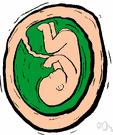fetus
Also found in: Thesaurus, Medical, Encyclopedia, Wikipedia.
fe·tus
(fē′təs)n. pl. fe·tus·es
1. The unborn young of a viviparous vertebrate having a basic structural resemblance to the adult animal.
2. In humans, the unborn young from the end of the eighth week after conception to the moment of birth, as distinguished from the earlier embryo.
American Heritage® Dictionary of the English Language, Fifth Edition. Copyright © 2016 by Houghton Mifflin Harcourt Publishing Company. Published by Houghton Mifflin Harcourt Publishing Company. All rights reserved.
fetus
(ˈfiːtəs) orfoetus
n, pl -tuses
(Biology) the embryo of a mammal in the later stages of development, when it shows all the main recognizable features of the mature animal, esp a human embryo from the end of the second month of pregnancy until birth. Compare embryo2
[C14: from Latin: offspring, brood]
Collins English Dictionary – Complete and Unabridged, 12th Edition 2014 © HarperCollins Publishers 1991, 1994, 1998, 2000, 2003, 2006, 2007, 2009, 2011, 2014
fe•tus
(ˈfi təs)n., pl. -tus•es.
(used chiefly of viviparous mammals) the young of an animal in the womb or egg, esp. in the later stages of development, in humans being after the end of the second month of gestation.
[1350–1400; Middle English < Latin fētus bringing forth of young]
Random House Kernerman Webster's College Dictionary, © 2010 K Dictionaries Ltd. Copyright 2005, 1997, 1991 by Random House, Inc. All rights reserved.
fe·tus
(fē′təs) The unborn young of a mammal at the later stages of its development, especially a human embryo from its eighth week of development to its birth.
fetal adjective
The American Heritage® Student Science Dictionary, Second Edition. Copyright © 2014 by Houghton Mifflin Harcourt Publishing Company. Published by Houghton Mifflin Harcourt Publishing Company. All rights reserved.
fetus
- A human embryo starts to be called a fetus at nine weeks.See also related terms for months.
Farlex Trivia Dictionary. © 2012 Farlex, Inc. All rights reserved.
fetus
An unborn mammal from when its adult features become recognizable. In humans, this is in the ninth week of development.
Dictionary of Unfamiliar Words by Diagram Group Copyright © 2008 by Diagram Visual Information Limited
ThesaurusAntonymsRelated WordsSynonymsLegend:
Switch to new thesaurus
| Noun | 1. |  fetus - an unborn or unhatched vertebrate in the later stages of development showing the main recognizable features of the mature animal fetus - an unborn or unhatched vertebrate in the later stages of development showing the main recognizable features of the mature animalabortus - a human fetus whose weight is less than 0.5 kilogram when removed or expelled from the mother's body craniate, vertebrate - animals having a bony or cartilaginous skeleton with a segmented spinal column and a large brain enclosed in a skull or cranium ductus arteriosus - a blood vessel in a fetus that bypasses pulmonary circulation by connecting the pulmonary artery directly to the ascending aorta; normally closes at birth umbilical, umbilical cord - membranous duct connecting the fetus with the placenta baby - an unborn child; a human fetus; "I felt healthy and very feminine carrying the baby"; "it was great to feel my baby moving about inside" |
Based on WordNet 3.0, Farlex clipart collection. © 2003-2012 Princeton University, Farlex Inc.
fetus
foetusnoun embryo, unborn child, fertilized egg The fetus can see, hear, experience and taste.
Collins Thesaurus of the English Language – Complete and Unabridged 2nd Edition. 2002 © HarperCollins Publishers 1995, 2002
Translations
plod
foster
sikiö
fetus
janin
fóstur
胎児
태아
foetus
făt
фетус
foster
ทารกในครรภ์
bào thai
foetus
(American) fetus (ˈfiːtəs) noun a young human being, animal, bird etc in the early stages of development before it is born or hatched.
ˈfoetal , (American) ˈfetal adjective of a foetus. in a foetal position.
Kernerman English Multilingual Dictionary © 2006-2013 K Dictionaries Ltd.
fetus
→ جَنِيـن plod foster Fötus έμβρυο feto sikiö fœtus fetus feto 胎児 태아 foetus foster płód feto плод foster ทารกในครรภ์ cenin bào thai 胎儿Multilingual Translator © HarperCollins Publishers 2009
fe·tus
n. feto, embrión en desarrollo, fase de la gestación desde los tres meses hasta el parto.
English-Spanish Medical Dictionary © Farlex 2012
fetus
n fetoEnglish-Spanish/Spanish-English Medical Dictionary Copyright © 2006 by The McGraw-Hill Companies, Inc. All rights reserved.